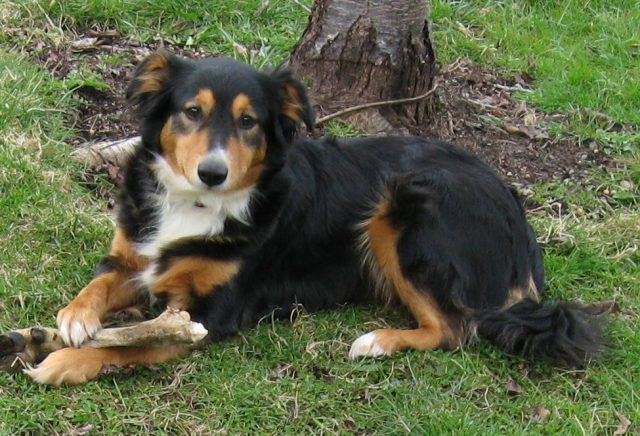Type the name of the breed you're looking for below
[wpdreams_ajaxsearchlite] Don't see the breed your're looking for? Click here and let us know!
Breed Characteristics
1 paw - breed exhibits the least amount of this characteristic
5 paws - breed exhibits most amount of this characteristic
English Shepherd
| Other Names | Farm Collie |
| Country of Origin | United States |
| Weight | Males: 45 - 60 lbs. (21 - 28 kg) Females: 40 - 50 lbs. (18 - 23 kg) |
| Height (at withers) | 18 - 23 in. (46 - 58 cm) |
| Coat | The coat is medium length and can be straight, wavy, or curly. There is frequently feathering on the legs and tail, as well as on the ear. |
| Colour | The primary coat colours are: sable and white (clear and shaded), tricolour, black and white, and black and tan. Other variations such as solid dogs of any colour, brindles, piebalds, and red nosed tricolours and sables also exist but are not common. |
| Litter Size | 4 - 8 puppies, average 6 puppies. |
| Life Span | 12 - 15 years |
| Origin & History | Originating in northern England and Scotland, these dogs came with the first settlers to reach the American colonies. American farmers appreciated this versatile breed and used dogs to protect their farms and livestock. The English Shepherd and various other collies were also referred to as Scotch Collie's during the 18th and 19th centuries but the term "Scotch Collie" fell out of favor during the 20th century. Quoting from Leon F. Whitney early in the 20th century ("How to Breed Dogs", 1937, no ISBN) "It is known variously as the farm shepherd, the barnyard collie, the old fashioned shepherd, the cow dog, the English Shepherd, and other colloquial names. And while I doubt there is a more alert, trustworthy, or American dog, still no breed specialty clubs have organized to push it. It is the ordinary shepherd that one sees on farm after farm throughout the country." ( Despite the publication date of 1937 given here English Shepherds were registered as a breed before that time through UKC (1927)) and probably the defunct Southeastern Kennel Club before then. UKC apparently had another registration going on for a type of "farm shepherd" that was separate from the English Shepherd. Many times the names were confused but at other times they were distinguished as different breeds.) All of these names as well as Farm Collie were applied to the farm shepherds of the era. As there was no breed club or registry until later, there is some dispute over exactly which name applies to which dogs. Australian Shepherd is likely a derivative of these farm dogs and appeared primarily in the Western United States. The English Shepherd on the other hand was more common in the Midwest and East. These dogs are primarily descendants of the working farm dogs of England. As the small diversified farms in the mid-western and eastern United States dwindled in numbers, many of them replaced by larger and less diversified operations, the English Shepherd became a rare breed. |
| Personality | The English Shepherd is energetic, intelligent, very active, agile, courageous and gritty. Fearless for its purpose. Acting immediately when commanded; very responsive to the master's voice. Adapting themselves almost at once to working commands around farm stock. Working characteristics include: strictly low heeling; and very free with the use of their teeth. Also very watchful as guards of the home. Companionable to their master. Primarily a stock dog, the English Shepherd has also traditionally been used for hunting and as a watchdog in addition to being the family pet. Recently there has been a growing interest in the English Shepherd as an athlete for competitive events such as agility, Flyball and Frisbee. Some individuals may excel in all of these activities, but most will have strengths and weaknesses for one or another purpose. Wonderful with children and not generally dog aggressive with other dogs, they are good with other pets if raised with them from puppyhood. Generally friendly dogs, however they can be reserved with strangers. They make wonderful watchdogs, alerting the owner of approaching strangers. The English Shepherd needs a firm, but calm, confident, consistent pack leader in order to be mentally stable. |
Care Requirements
| Health | Because of their medium size and the fact that they have not been aggressively over-bred, English Shepherds are generally healthy dogs, typically avoiding problems (like hip dysplasia) that are more common in some other breeds. However, anyone contemplating getting an English Shepherd would be well advised to research the hip ratings (OFA or PennHIP) of the breeder's stock as with any other breed. Recent research at Washington State University indicates that, in addition to many other herding breeds, approximately 15% of the English Shepherd population is subject to the MDR1 gene mutation. Dogs that are tested positive have increased sensitivity and adverse reactions to a number of common canine drugs. A simple cheek swab is all that is needed to test if the dog has this potentially life-threatening condition. |
| Grooming | As a working dog, the coat should be easy to keep, requiring very little grooming. Dirt tends to just fall away. English shepherds tend to shed quite a lot and fur may be found on and under furniture, clothes, and carpeting. |
| Exercise | This breed needs to be taken on daily walks or jogs. |
| Other Considerations | English Shepherds are often larger than Border Collies, but the quickest way to tell the two apart is to put them on stock. Border Collies tend to herd with a distinctive strong eye contact and a crouching stance, while English Shepherds have an upright, loose-eyed herding style. English Shepherds can work all types of stock—from the meanest bull to baby chickens. Compared to others, they are prized above specialty herding breeds for being as gentle as possible or as tough as necessary with the stock. This ability to rate their stock stems from the great empathy they have for their family and livestock. With the right upbringing, this empathy makes the English Shepherd a wonderful family dog. However, the same bossy nature which this breed excels at in keeping order on the farm can cause havoc in the local dog park where the English Shepherd often appoints himself as the leader. |



